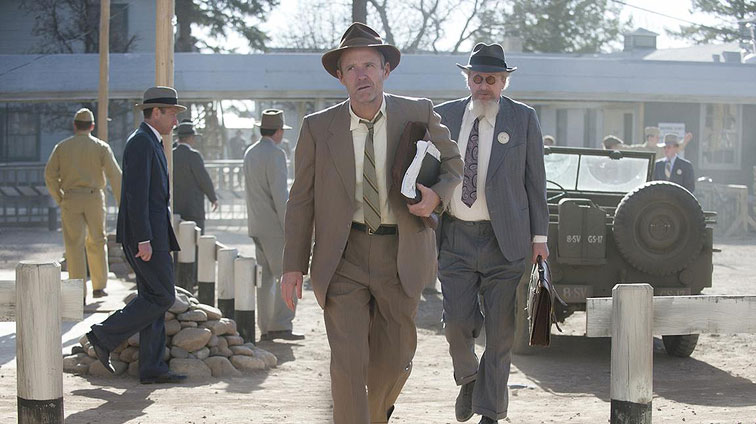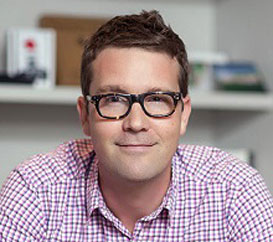
Inventing the End of the World
Manhattan’s Sam Shaw makes use of the “hive mind” and his own obsessive attention to detail to dramatize the lives of those burdened with the task of potentially killing millions in the name of world peace.
 Sam Shaw
Sam Shaw
We have 11 acres of practical sets in Santa Fe, it's like walking into a time warp—it's like Colonial Williamsburg, except instead of churning butter, we're inventing the end of the world.
Showrunner Sam Shaw has made a career writing about obsessives and eccentrics. As a journalist, he got his start covering topics such as the guy who founded cryogenics by freezing the first human being for This American Life and the world’s longest foot race for Harper’s Magazine. That second one doesn’t sound too obsessive? Listen to how it’s run.
“These guys run 50 miles around the same block every day for months and months until they hit 3,100 miles,” Shaw explains. “I spent about a month and a half hanging out and jogging around the block with these guys, trying to figure out what could possibly possess someone to do that.”
So does that make Our Man Shaw is a bit obsessive himself? By his own account, perhaps. “There's probably some OCD in me,” he shrugs.
If there’s any doubt, have a look at the loving detail poured into his latest obsessive creation. Manhattan is a WGN drama based on the lives of the scientists who developed the atomic bomb during World War II in Los Alamos, New Mexico. Although the show is largely fictional, it is based on real events—and that requires real research.
“Over a course of five years, I read hundreds of books on the subject and collected tons of primary source material,” says Shaw. “I went down the rabbit hole with the research, which in a way is probably a form of procrastination too, because it feels like it's part of the writing process, but it doesn't involve actually writing.”
Thanks to this approach, along with some help from the “hive mind” of Shaw’s writers’ room, Manhattan does an impressive job of capturing the hearts and minds of an eclectic group of geniuses in the 1940s burdened with the task of potentially killing millions in the name of world peace.
Is it as exciting as a bunch of guys running around the block? There’s only one way for you to find out.
How do you intersect what really happened with the story you want to tell?
I wish that I could say that there's an algorithm or a hard and fast set of rules that we set for ourselves but it's a little bit like the famous quote, "What's the definition of pornography? You know when you see it." We make gut calls and instinct calls. The basic approach to the show that I had when I started working on it is that we use the history and the science as a scaffold for our own fictional character storytelling.
There are only a couple of historical figures in our show, so all of the character storytelling is fictitious. So for us that means that the specifics of what happened on a particular Tuesday in October at Los Alamos, more often than not, are invented, although there are milestone events in the life of the place that we draw from. But nobody's going to tune into an episode of our show and see an atomic bomb dropped on Chicago, so we're involved in a work of historical fiction but not a work of counter-factual speculative sci-fi fiction or anything like that.
Do you think it's your responsibility to do that?
I do feel a huge responsibility. I used to be a journalist and found that work to be really crushingly hard. Not because of the day-to-day work of interviewing people and the prose writing—although writing prose sentences can sometimes feel like scaling the Matterhorn—but because I felt a real obligation to honor the stories that were told to me and to represent them faithfully.
Any time you're creating art of some kind or telling a story that deals with facts you enter this odd twilight zone where you have to make judgment calls about the stories that you're telling and the ethics of the storytelling that you're involved with. That's something I find fascinating and I take pretty seriously.
This is this incredibly riveting piece of American history that unfortunately a lot of people in the present day don't know a lot about. So I do feel some responsibility to capture at least the emotional truth of what the experience of the people who lived in that place was like, and I feel a responsibility to the science community too. This is a story that's about physicists, and I'd feel terrible if I didn't do everything in my power to represent the work that was done in this place with some fidelity.
Do you talk to people who are actually there? Are they part of your research?
Yeah, I have talked to some. There are very few physicists who were involved with the project who are still alive, but there are people who grew up in Los Alamos. We had some people come and tour our stages in New Mexico who had grown up Los Alamos during the war time, and it was incredible. It was incredible to see them respond to this kind of world we've built there. We have 11 acres of practical sets in Santa Fe, it's like walking into a time warp—it's like Colonial Williamsburg, except instead of churning butter, we're inventing the end of the world. You walk around, and it really feels like you're transported back to 1943.
There seems to be a trend towards smarter shows on TV lately, including this show—a lot of which goes over my head. Why do you think that's happening?
First of all, thanks—not in terms of things going over your head. Although I will say this: one thing that felt important to me, and I know it felt important to Tommy too, when we were talking about the show in the early going was that the scientists talk like scientists and that they don't bother to translate for the viewer. That's something that The West Wing did so brilliantly, for me, and Mad Men does it too. And Boardwalk Empire does it.
I would say when I watch those shows, which are shows that I love, probably 15 percent of the dialogue just flies right over my head, and that's okay for me.
Certainly, it's never the intention of our show to alienate anybody, but it's a show that involves some real smarties, the smartest people on the planet, people who are certainly a lot smarter than I am, and we wanted to make their world feel credible along with delivering a show that is fun and strange and exciting and sexy at times. But the show has to be smarter to make that world of the science so credible.
In terms of the trend, a lot of people talk about this sad trend in feature films toward a mass dumbing down, and part of that might have to do with demographics, with courting a much younger audience, and this move towards fewer bigger bets and giant tentpoles. Probably some of it has to do with international markets and making movies that export well and that sort of thing. But for me, there are fewer and fewer movies released that actually excite me or interest me and fewer and fewer that seem like they're made for an adult audience. Simultaneously, there has been more and more TV that's made for an adult audience and for a more sophisticated audience. Part of it is that TV is such a great place for sophisticated adult storytelling, in part because of the giant canvas. You develop relationships with characters and you get to spend, in success, 100 hours with them or more. Along the way you can delve into complicated subject matter that it might be harder to delve into in two hours in a movie.
There have always been great bastions of really, really smart storytelling on television. But I agree with you, it does seem like right now it's kind of a golden moment for those kinds of stories.
How do you go about, practically, writing a bunch of people who are smarter than you are? I mean it's not like you can call in a stunt brain.
I wish that I could call in a stunt brain. Sometimes we call in the kind of “hive mind.” The hope is when you have a staff of really smart people you've hired to help you think about a show and write the show, that collectively the best idea rises to the top and that collectively you're smarter than any one individual. In terms of the science, we have help from some fantastic advisors. We work with a guy who's a physics professor at UCLA named David Saltzberg, who incidentally is also the science consultant for The Big Bang Theory. He's incredibly smart, and I'm sure he's a great teacher too because he exercises a huge amount of generous patience while talking to us—and I'm sure that he exercises that in the classroom too. That's incredibly helpful to us as we're thinking about a piece of story, and there's a piece of physics that we need help with or if there's a story that needs to revolve around a scientific discovery. It's really helpful to talk to somebody who can help us get our heads around what is, for me at least, a really abstruse topic. I was not a science guy. I didn't study physics in college. The last physics class I took was many, many years ago, as like a junior in high school.
Also we do a lot of research and a lot of reading. Basically everybody that worked on the show in one definition or another is a bit of a nerd, you know? We're all people who really love the research aspects of the job and kind of fell in love with the subject matter, so that helped.
© 2014 Writers Guild of America West
